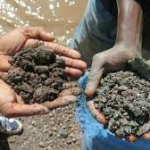 Congo’s Entreprise Générale du Cobalt (EGC) could become the world’s fourth-largest cobalt producer by 2021, according to a new report from Roskill.
Congo’s Entreprise Générale du Cobalt (EGC) could become the world’s fourth-largest cobalt producer by 2021, according to a new report from Roskill.
According to the company, if the state-owned company is able to capture all 8,000 tons of cobalt expected to be produced by artisanal and small-scale miners in the African country, then it could become a major player, only behind Glencore, ERG and China Molybdenum.
EGC was created a year ago, but became operational in late March. The company holds monopoly rights to buy, process, sell and export the hand-mined blue metal in the DRC and will sell cobalt hydroxide under a five-year contract with trading house Trafigura.
The Democratic Republic of Congo holds about 70% of the world’s cobalt reserves and is also the largest producer, accounting for more than 70% of cobalt mining supply in 2020.
By 2021, consulting firm CRU expects Congo’s large and small mines to produce more than 100,000 tons of cobalt, or 71% of the global total.
Supply from the country’s artisanal miners, however, is highly elastic and dependent on prevailing cobalt market prices. According to Roskill, over the past five years (2016-2020), it has accounted for an average of 14% of DRC’s annual production.
The Entreprise Générale du Cobalt has been tasked with addressing a myriad of environmental, social, and governance factors affecting artisanal and small-scale cobalt production in the country, particularly child labor and the lack of safety measures.
This is why the agreement with Trafigura also includes funding for the creation of tightly controlled artisanal mining zones, purchasing centers and logistics to track supply.
According to Roskill, however, the creation of these zones comes with challenges such as the actual ability to police and enforce them. Most of the designated zones are remote and are not as well mineralized as the large-scale concessions held by large mining companies.
As a result, these will continue to attract attention. Thus, the plan to address and deter artisanal miners from encroaching on private mining concessions will need to be carefully determined and implemented.
But if these challenges are addressed, changes are implemented, and small-scale operations provide the 8,000 tons of cobalt expected at EGC this year, the results for what is considered one of the poorest countries in the world, could be outstanding.
.gif) Loading
Loading

